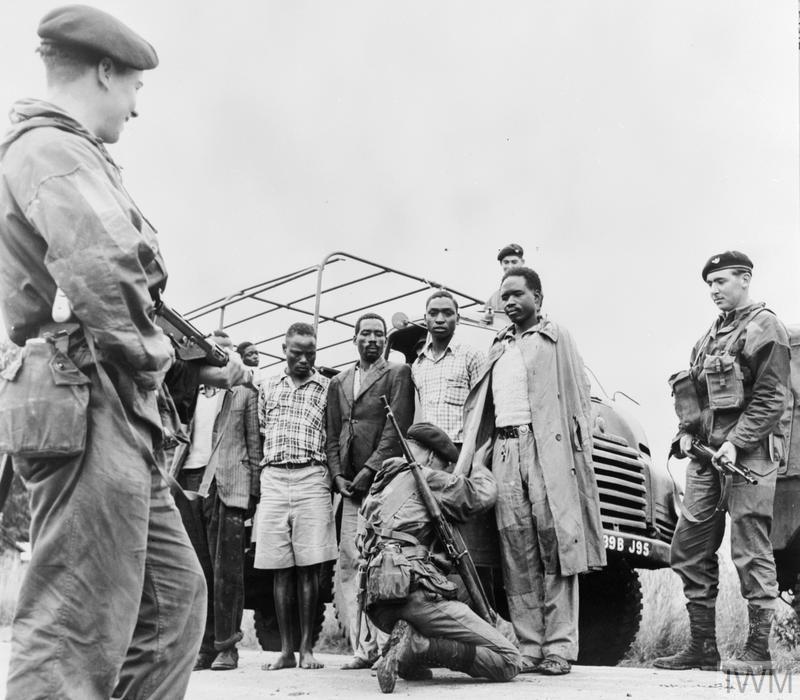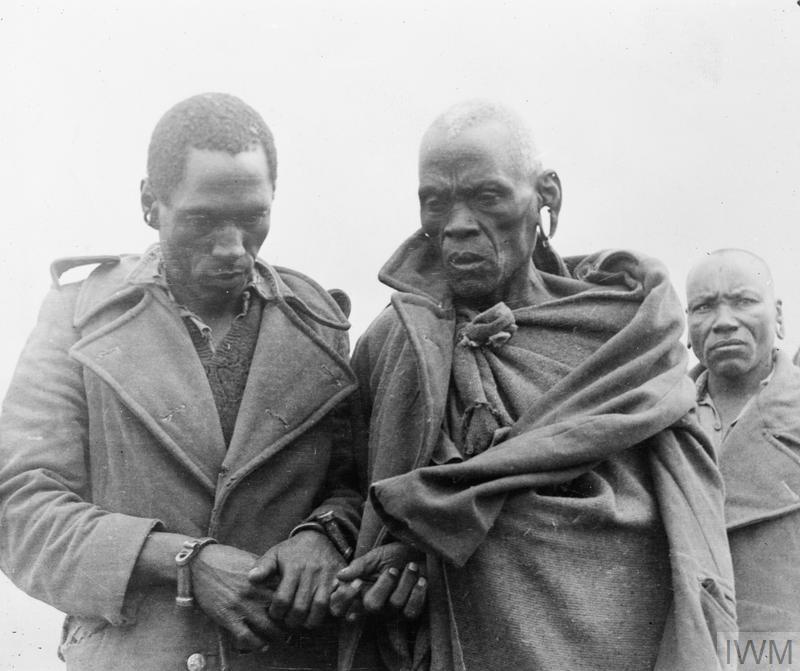Kenya: The Mau Mau

Note: One paragraph of this text contains descriptions of war crimes such as torture and rape.
After World War II, an active labour movement surfaced in Kenya, conducting strikes and training activists. Gradually, this grew into a liberation movement, lead by the organisation Kenya African Union. At the same time, the white settlers were modernising their farms, and land workers grew poorer and more desperate. The settlers’ political power grew, and they looked to the apartheid regime in South Africa for inspiration.
The new liberation movement organised protests and minor attacks on the settlers’ farms. In 1952, the colonial government responded by declaring a state of emergency, allowing them to arrest and intern people without trial. The British underestimated the opposition to colonial rule, and the result was that more people joined the movement that the British called Mau Mau. The name preferred by Kenyans was Kenya Land and Freedom Army.
While people from other ethnic groups participated in the movement as well, the government chose to target the Kikuyu. At a razzia in 1954, 25 000 Kikuyu were sent to internment camps, while most of the women and children were deported to reservations. This was a collective punishment, and an ethnic cleansing aimed at destroying the Kikuyu. More than 150 000 were eventually detained. They were without legal rights, and there was widespread torture and abuse. Officially, the camps were supposed to 'rehabilitate' the prisoners.
Over the next couple of years, 1.2 million Kikuyu were forcibly relocated to 850 new villages behind barbed wire. During what the British called 'The Emergency' African people were pitted against each other by the colonial powers. When Kenya achieved independence in 1963, the new president encouraged everyone to leave the past behind them.
In 2011, Ndiku Mutua, Paulo Nzili, Jane Muthoni Mara and Wambugu Wa Nyingi came to London. As claimants, they represented 5000 of the more than 15 000 people who had shared their stories with the Human Rights Commission in Kenya over the past decade. They were joined by three historians who had studied both written and oral sources about the Mau Mau and published articles about this. Now the four elderly people were suing the British government, and they wanted their stories told.

One of the claimants described how he was detained for nine years, much of the time in manacles, and beaten unconscious. Two of them had been castrated by having their testicles crushed. One of the women had been raped with a hot bottle and had witnessed gang rapes in the prison cells. The fourth woman had not been part of the movement when the family had been randomly arrested on a trip to Nairobi. She was nine months pregnant, but the baby died in the womb due to the beatings. When she was released, her other three children had disappeared, she was infertile after sexual violence, and her husband had been castrated.
During the first round of hearings, the government argued that because Kenya had inherited the British legal responsibilities when they achieved independence, the claimants should be suing their own country instead. During the second round, they acknowledged that murder and torture had taken place, but argued that too much time had elapsed. This argument was rejected by the courts when it was revealed that the government had held back documentation. A secret archive of more than 8 000 files from 37 former colonies was opened. Among the papers that had been withheld both from the courts and from the UK national archives for decades, there was a memo from Kenya’s attorney general, Griffith-Jones. He described the mistreatment as 'distressingly reminiscent of conditions in Nazi Germany' but agreed to draft legislation to make the beatings legal as long as the abuse was kept quiet: 'If we are going to sin, we must sin quietly'.
In 2013, the foreign secretary William Hague made a statement to the House of Commons, of something vaguely resembling an apology: 'The British Government recognise that Kenyans were subject to torture and other forms of ill treatment at the hands of the colonial administration. The British Government sincerely regret that these abuses took place and that they marred Kenya’s progress towards independence. Torture and ill treatment are abhorrent violations of human dignity, which we unreservedly condemn.'
Stuck between victim blaming, praise of the colonial administration, and denial of liability, it was still the first time the United Kingdom made any kind of public apology for something that had happened during the colonial era. Wanting to avoid light being shed on more stories of post-war torture, rape, and murder, the British government agreed to a settlement. The five thousand survivors would each get around three thousand pounds. The UK also promised to fund a memorial in Nairobi to the victims of colonial-era torture.
Discuss:
Work in groups and discuss the questions.
Why do you think it was so important for the UK Government to not assume financial liability for what happened during the colonial era?
The treatment of the Kikuyu happened as late as the 1950s, starting while Winston Churchill was prime minister. As Griffith-Jones commented at the time, it reminded him of Nazi Germany. How do these actions compare with the image of British post-war democracy and civilisation? Would it have seemed different if it had happened in the 1800s?
Hague informed the House of Commons that, as part of the settlement, 'The Government will also support the construction of a memorial in Nairobi to the victims of torture and ill-treatment during the colonial era. The memorial will stand alongside others that are already being established in Kenya as the country continues to heal the wounds of the past.' What is the importance of memorials in public spaces?
In the debate in the House of Commons following Hague’s statement, the Conservative MP Bob Stewart spoke: 'I support what we have done. However, when I was a little boy my father was a soldier operating in Aden, and I remember being absolutely petrified by the stories of British-origin settlers and farmers being chopped to bits by the Mau Mau. I note that we are going to subsidise and help to build a memorial to the Mau Mau, but may I make a suggestion? Given that not only were 200 British soldiers and policemen killed, but 1,800 civilians perished as a result of Mau Mau activities, I think that it would be very appropriate for a memorial to be erected to them –both Kenyans and those of British origin.'
32 of the 1800 people Stewart refer to were of English origin, the rest belonged to different African ethnic groups, including Kikuyu. In the spirit of reconciliation, what would be the pros and cons of erecting such a memorial in present-day Kenya?Tessa Munt, MP (Liberal Democrats) made the following suggestion in the debate: 'I wonder whether there should be a debate about the past, and whether we ought to make sure that adults, some of whom will remember these events, know about what happened, and also that young people learn from this period of history. Might the Foreign Secretary speak to the Education Secretary and consider whether this part of our colonial past, which did not cover us with glory, might be a topic for discussion in schools?'
In the YouGov 2019 opinion poll about attitudes to the British Empire, 21 per cent of 18-24-year-olds answered 'yes' to the question 'Would you like Britain to still have an empire?', and 18% believed the British Empire was something to be proud of. Older people were more positive to the empire. What impression does this give you of the British collective memory and attitudes to their colonial past?
Relatert innhold
On 30 January 1972, British soldiers shot 26 unarmed civilians during a protest march in Northern Ireland.